
搭子社交英语作文
TheRiseof"Dazi"Socializing:ANewWaytoConnectinModernChina
Inrecentyears,auniquesocialphenomenoncalled"dazi"(搭子)hasgainedpopularityamongyoungChinese.Unliketraditionalfriendships,whichoftenrequiredeepemotionalbonds,"dazi"referstotemporarycompanionsforspecificactivities,suchasgymbuddies,studypartners,ortravelcompanions.Thistrendreflectsthechangingdynamicsofsocialinteractioninafast-paced,urbanizedsociety.
Theappealof"dazi"liesinitsflexibilityandlowcommitment.Forbusyprofessionalsorstudents,findingtimeforlong-termfriendshipscanbechallenging."Dazi"offersapracticalsolution—peopleconnectbasedonsharedinterestsorimmediateneedswithoutthepressureofmaintainingalastingrelationship.SocialmediaandappslikeXiaohongshuorWeChatgroupsfurtherfacilitatetheseconnections,makingiteasytofindlike-mindedpartners.
However,criticsarguethat"dazi"relationshipsmaylackdepth,reducingsocialtiestomeretransactions.Yet,supporterscounterthatsucharrangementsprovidecompanionshipinanincreasinglyisolatedworld,especiallyforthosenewtoacityorfacingtightschedules.
Ultimately,"dazi"socializinghighlightsashiftinhowyoungpeoplebalanceindependenceandconnection.Itmaynotreplacetraditionalfriendships,butitoffersacreativeadaptationtomodernlife’sdemands.Associetyevolves,sotoodothewaysweforgehumanconnections—whetherfleetingorenduring.
- 从吉林出发,有没有一起结伴旅游的搭子?想去长白山或者延边,时间灵活可商量!
- 《在北京找拍照搭子指南:解锁城市美景,遇见同频摄影伙伴》
- 「北京新手摄影搭子」:用镜头探索城市,让拍照不再孤单
- 《寻找天柱山“爬山搭子”:一个人太孤单,一群人刚刚好》
- "南宁酒搭子姐妹平时都喜欢去哪家酒吧?求推荐氛围好又不踩雷的!"
- 在上海张江附近有没有适合新手骑行的路线推荐?想找骑行搭子一起探索!
- 从长沙去凤凰古城,怎么找搭子一起同行?
- 请问有没有人一起去深圳到厦门旅游的搭子?
- 寻找“25化学考研搭子”,共赴知识之旅
- 在呼和浩特想找同城搭子一起运动、探店或者周末活动,有什么靠谱的渠道推荐吗?
- 大理苍山徒步适合找什么样的搭子?需要注意什么?
- 《合肥骑行记:寻找城市里的自行车搭子》
- 在成都武侯区哪里可以找到一起打羽毛球的搭子?
- 今天约饭搭子吃饭,结果他说跟别人吃去了,这种情况该怎么处理?
- 《石家庄情侣搭子:都市爱情新趋势,共享生活的小确幸》
- 《上海搭子22号:都市青年的社交新趋势与情感联结》
- 《小鬼深圳演唱会搭子指南:从组队到嗨翻全场的终极攻略》
- 裸辞后想找个“搭子”一起旅行/学习/搞钱,但担心对方不靠谱,该怎么筛选和相处?
- 打麻将的智慧:为何“留生拆搭子”是高手必备技巧?
- 《哈尔滨哈西饭搭子:美食江湖里的烟火与温情》